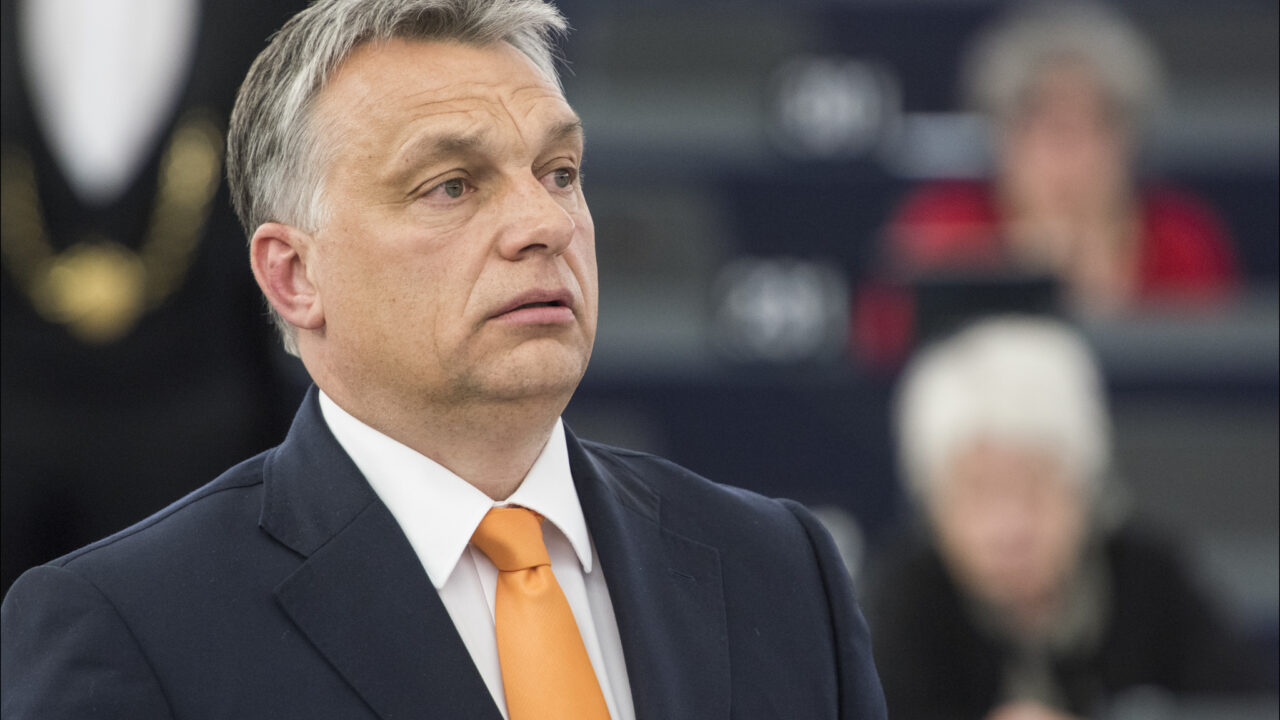Alignment or isolation: Hungary’s foreign policy after its parliamentary election
Hungary’s parliamentary election could be a turning point in its foreign policy. An opposition win could mean realignment with the EU, but polls suggest that it might be a tight race
On 3 April, Hungary will hold a parliamentary election. International affairs are rarely a matter of public debate in the country, let alone a hot campaign topic. But Russian President Vladimir Putin’s war on Ukraine has pushed Hungary’s foreign policy orientation to the top of its domestic agenda.
Prime Minister Viktor Orban responded to Putin’s invasion by attempting to balance Hungary’s relations with Russia and the West. Opposition candidate Peter Marki-Zay’s six-party coalition rejects this strategy – as well as the Fidesz-led government’s broader foreign policy. In turn, the opposition has framed the upcoming election as a choice for Hungarians between Russia and the West.
Internationally, the Orban government’s half-hearted support for EU sanctions on Russia has exacerbated concerns about Budapest’s reliability, further diminishing trust in the country among Western states. Therefore, the election will have significant international implications. Recent polls suggest that it might be a tight race. A coalition of left-wing, centrist, and green parties has its best chance of winning since 2010.
An opposition victory would mean a break with the foreign policy of the past decade – and the end of the Orban government’s flagship project, the ‘eastern opening’ policy. Through this initiative, Hungary built close and uncritical relationships with authoritarian states such as China and Russia, in the hope of economic returns. But these new partnerships have discomfited Hungary’s Western allies. The opposition has promised that, if it wins the election, it will repair Hungary’s international image and play a constructive role in the European Union and the transatlantic community.
There is indeed room for improvement. Due to Orban’s strong ties with Moscow, many Europeans view his government as the Kremlin’s Trojan horse in the EU. In 2014, for example, the Orban government granted Russia’s state atomic energy corporation, Rosatom, a contract without tender to expand the Paks Nuclear Power Plant. The government recently invited the Russian-led International Investment Bank (IIB) to set up its headquarters in Budapest, providing diplomatic immunity to its staff.
The opposition has promised that, if it wins the election, it will repair Hungary’s international image
In an abandonment of values-based foreign policy, the Orban government regularly blocks or waters down common EU positions that condemn violations of human rights and international norms – especially those regarding China. The opposition has pledged to break with this practice. It aims to readjust Budapest’s relations with both Beijing and Moscow in a way that promotes mutually beneficial economic cooperation without indulging in political gestures towards China and Russia at the expense of EU unity.
In doing so, the coalition would drop controversial plans for a Budapest campus of China’s Fudan University. It would also review Chinese contracts for the Budapest-Belgrade railway project. However, the opposition has not yet scrutinised Huawei’s strong presence in Hungary, which includes a major role in the country’s 5G rollout and other projects. On Russia, a Marki-Zay government would leave the IIB and expel it from Hungary, revise the Paks deal, cease cooperation with Rosatom, and support Ukraine’s Euro-Atlantic orientation – including the country’s cooperation with NATO.
A Marki-Zay government would maintain Hungary’s traditional support for EU enlargement in the Western Balkans. But it would require candidate states to meet the union’s democratic standards. In other words, the opposition plans to uphold the Copenhagen criteria. This seems especially important given Hungary’s experience of democratic backsliding under Orban.
Additionally, the opposition has signalled its intention to break with the Orban government by supporting a more assertive EU foreign and security policy. For example, the coalition’s manifesto indicates that it supports qualified majority voting in this area. Similarly, the manifesto expresses general support for the development of a European army with a joint command – even if this is not an urgent priority.
However, a Marki-Zay government would take a quicker step to recommit to the EU by joining the European Public Prosecutor’s Office. This would be part of the first stage of an effort to reverse the democratic backsliding and sanction the corruption that have made Hungary more vulnerable to Russian and Chinese influence, and that have prompted the country’s clashes with EU institutions over the rule of law.
Although the opposition’s prospects are better than they have been for some time, there is a good chance that Orban’s Fidesz will retain power for a fourth consecutive term. In this case, there is unlikely to be an overhaul of Hungary’s foreign policy – even in light of Russia’s aggression against Ukraine. The Orban government sees such an overhaul as politically costly and at odds with its economic interests and regime security.
Instead, Orban would likely continue his balancing act. This would involve offering the bare minimum to Hungary’s Western allies – which would be insufficient to regain their trust. Given the effects of the war in Ukraine, Orban’s equivocation would continue to damage Hungary’s relationships with regional partners such as Poland. Indeed, signs of tension between Warsaw and Budapest are already apparent. At the same time, intensifying EU sanctions on Russia would make it increasingly difficult for a Fidesz-led government to maintain friendly ties with Moscow – as shown by the Kremlin’s recent inclusion of Hungary on its list of “unfriendly” countries, in retaliation for EU sanctions. All in all, a continuation of Fidesz’s current foreign policy would leave Hungary ever more isolated.
Zsuzsanna Vegh is an associate researcher at the European Council on Foreign Relations.
The European Council on Foreign Relations does not take collective positions. ECFR publications only represent the views of their individual authors.



